When I first discovered AI chatbot training positions last year, I was skeptical. Can you really make $40+ an hour training conversational AI systems out of your home office? After working six months on projects for companies like RWS and Pareto.AI, I can say that AI chatbot training jobs are among the fastest-growing remote work opportunities.
What are AI chatbot training jobs?
AI chatbot training jobs involve data annotation, response improvement, and quality assessment to ensure AI systems are effective. Jobs that can be done at home pay $15-$90 an hour. No experience in AI is needed. Companies will train you properly. They aim to improve their AI models’ ability to understand human language and context more effectively.
The Explosive Growth of AI Chatbot Training Opportunities
The AI chatbot training job market has experienced unprecedented growth throughout 2024 and into 2025. According to recent market analysis, 30% of US companies have already replaced workers with AI tools like ChatGPT, creating a massive demand for human trainers who can teach these systems to communicate more effectively.
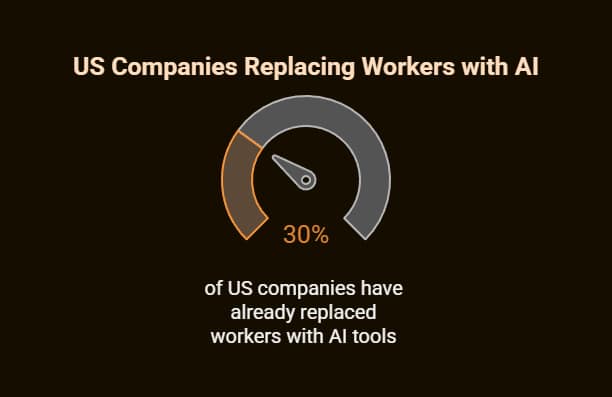
When I began examining those roles in early 2024, I found fewer than 200 suitable roles on the popular platforms. Today, Indeed alone shows over 285 AI chatbot training positions, with new opportunities posted daily across platforms like ZipRecruiter, Upwork, and specialized AI training communities.
The salary ranges have also evolved significantly. Entry-level training jobs pay about $15 per hour, while expert trainers earn $40-$90 per hour for niche work. In the first month of working with Pareto.AI, I earned an average of $32 per hour doing financial AI model training, which involved assessing complex economic scenarios and correcting chatbot reasoning.
Real-World Experience: What AI Chatbot Training Actually Involves
My Journey Into AI Training
I started training AI chatbots after observing a posting by the TrainAI community of RWS. The application was simple enough. I sent my resume and completed a short assessment that tested my ability to respond to conversations. Just two weeks later, I got a neat invite. My first project, to train a customer service AI chatbot. The client was a large telecom company.
The task consisted of looking through thousands of conversation pairs and rating the quality of responses.
Then, the analyst had to explain why the other responses were inappropriate or unhelpful. At first, before I figured out how to get GPT-4 to do the work for me, I was using the app for about 3 to 4 hours a day and getting paid about $18 an hour to learn about AI behavior.
Technical Skills You’ll Actually Use
You do not need to know how to program for AI chatbot training jobs, contrary to popular belief. The platforms I’ve worked with, like RWS’s TrainAI interface and Pareto.AI’s evaluation system, are easy-to-use web-based tools requiring only.
- Good written communication skills in English.
- Make sure to pay attention to the details it helps in assessing the quality.
- A simple idea of the chat context.
- The skill to recognize flaws in artificial intelligence.
While training financial AI models, I relied on metrics offered by the client for evaluation purposes. The platform guided me through each scene’s accuracy, relevancy, tone appropriateness, and credibility with examples and marking rubrics.
The Real Earning Potential: Beyond the Marketing Claims
Breaking Down Actual Compensation
The $15-40 per hour jobs for AI chatbot training that one sees advertised are true and false. Based on my experience across multiple platforms.
Entry-Level Positions (0-3 months experience)
- General conversation training: $15-$20/hour.
- Basic customer service scenarios: $18-$25/hour.
- $15-$22/hour for completing simple tasks.
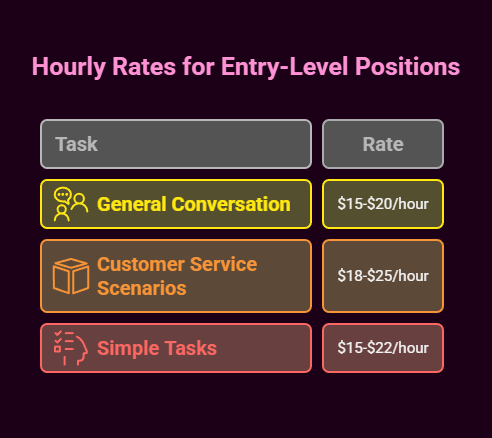
Specialized Training (6+ months experience)
- Training on AI in Finance $30-$50/Hour
- Healthcare conversation evaluation: $35-$55/hour.
- Legal document analysis: $40-$70/hour.
- AI Training for Technical Support: $25-$40/hour.
In my busiest week in December 2024, I worked three different jobs for 28 hours and earned $1,247, or about $44.54 per hour.
The Project-Based Reality
Unlike jobs of employment, AI chatbot training jobs are project-based. When new projects come up, RWS, Pareto, and others send you email invitations to apply. I would often receive between two and three project invites every week. During the summer months, there were often lags of 2-3 weeks.
Payment processing varies by platform. RWS pays bi-weekly via PayPal or bank deposit, while Pareto.AI pays weekly. Both companies are transparent about tracking payments, and I was never paid late.
Major Platforms and Companies Hiring AI Trainers
RWS TrainAI Community
RWS has the biggest artificial intelligence training community I know. Their platform offers diverse project types, including:
- Online content rating.
- Search result evaluation.
- Data annotation and labeling.
- Conversation quality assessment.
- Advertisement relevance scoring.
To apply, you will need some personal information and work authorization. After you get accepted, you start receiving invitations to projects based on your language, location, and performance. I really like their full training materials and active support team.
Pareto.AI: Premium Training Opportunities
The top AI focuses on the high-value training subject matter expert or those generally in need. Their screening process includes:
- Detailed application with portfolio submission.
- Paid trial assessment (usually 2-4 hours of work).
- Interview with project managers.
- Specialized training certification.
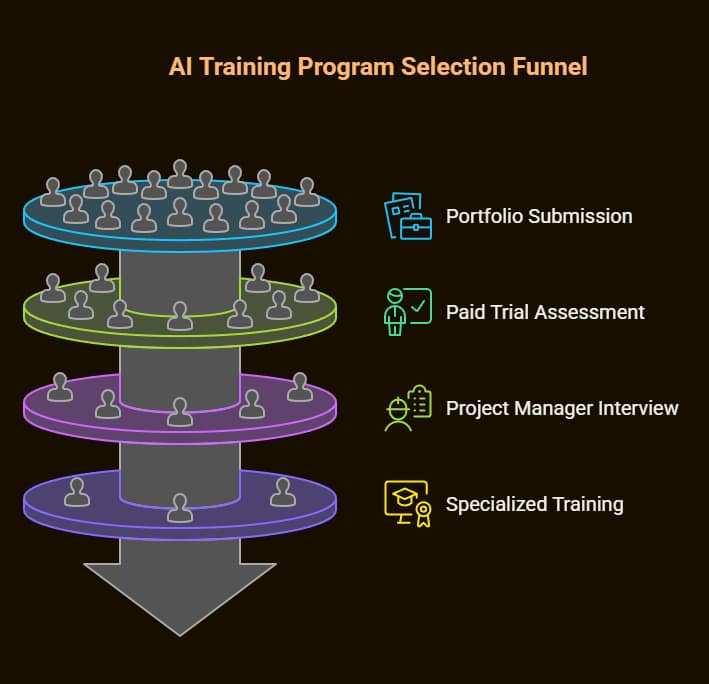
My average hourly rate with Pareto.AI was $41, while my average hourly rate with RWS was $23. Still, projects are lesser available and qualification standards are far more stringent.
Indeed and ZipRecruiter Listings
Job boards are increasingly getting filled with training jobs for chatbots by companies and startups. People get jobs from direct employment or contract jobs. I’ve found success responding to postings that specify:
- Remote work flexibility.
- No programming requirements.
- Training provided.
- Performance-based compensation.
The last listings I saw were with Microsoft Azure AI teams, fintech startups, and edtech companies building tutor chatbots.
Industry Trends Reshaping AI Training Demand
The Financial Services Boom
The financial sector has the most scope for AI chatbot training. In my six months of working on financial AI projects, I saw companies focus first on training the chatbot for:
- Investment advice conversation handling.
- Fraud detection response systems.
- Customer service automation.
- Regulatory compliance communication.
The complicated rules concerning money cause a big need for real trainers who can teach AI what to say about tricky money questions.
Healthcare AI Training Surge
There is a high demand for training healthcare chatbots. Though I haven’t worked much in this industry but TrainAI community colleagues say they always have projects to work on:
- Patient symptom assessment conversations.
- Medication information accuracy.
- Evaluation of support responses for mental health.
- Healthcare provider referral recommendations.
Most projects require background verification and customized training. However, they also offer good pay and comply with the regulations of the industry.
Challenges and Realistic Expectations
Inconsistent Work Flow
The most challenging thing I find due to AI chatbot jobs is income uncertainty. Project availability varies greatly, unlike employment. My monthly earnings were as low as $347 in August during a quiet month and as high as $3,200 in November when various high-value contracts overlapped.
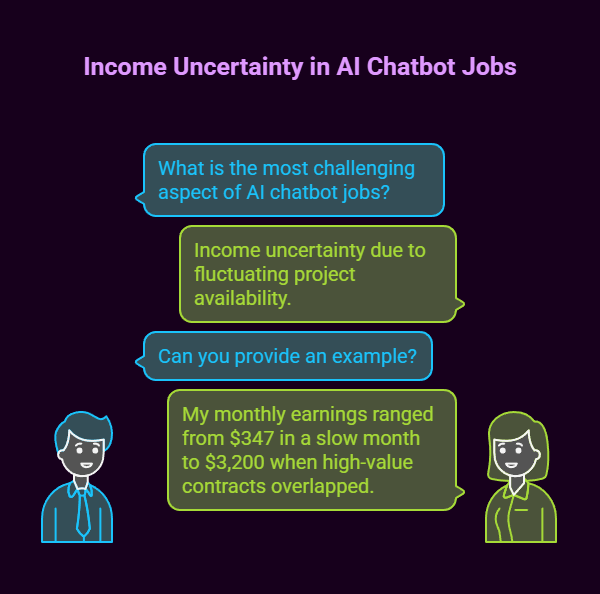
Successful trainers diversify across multiple platforms. I keep up-to-date profiles on RWS, Pareto.AI, and two smaller niche sites, which help keep opportunities coming.
Quality Standards and Feedback
AI training platforms maintain strict quality standards. In my first month, about 20% of my work needed editing according to client feedback. While the sites will give you a thorough explanation of the scoring, it is not always easy to pick the game up.
The feedback system of Pareto.AI was particularly helpful, as the project managers provided specific guidance to improve the consistency of evaluations. The pay rates for trainers and the trainer turnover are lower because of this.
Technological Evolution Impact
The fast growth of AI capabilities shapes trainer demand in surprising ways. ChatGPT and similar models are getting better, and some basic training tasks are now automated. But this requires a lot of advanced evaluative work that requires intelligent judgment and context.
The latest projects I worked on are increasingly focused on edge cases, conversations where systems fail to comprehend nuance and cultural context or ethical considerations requiring human interpretation.
Strategies for Success in AI Chatbot Training
Building Your Profile and Portfolio
AI trainers succeed by developing specializations and charging premium rates. From what I have seen and experienced with other top earners.
I save every correspondence related to the issue, and it gives my project a good edge. When applying for particular jobs, this portfolio comes in handy.
Focus on 2-3 areas to achieve expertise instead of taking whatever comes. As I trained in financial and customer support AI, I got opportunities for higher pay jobs.
Platforms measure the performance of trainers. If you maintain your standards, it will be easy for you to get premium jobs.
Technical Preparation
Coding skills are not needed, but some tech skills will help you earn more:
- Experience with spreadsheets to organize data.
- An understanding of what AI can and cannot do.
- Strong research skills can fact-check AI’s responses.
- I can give feedback using a grading platform.
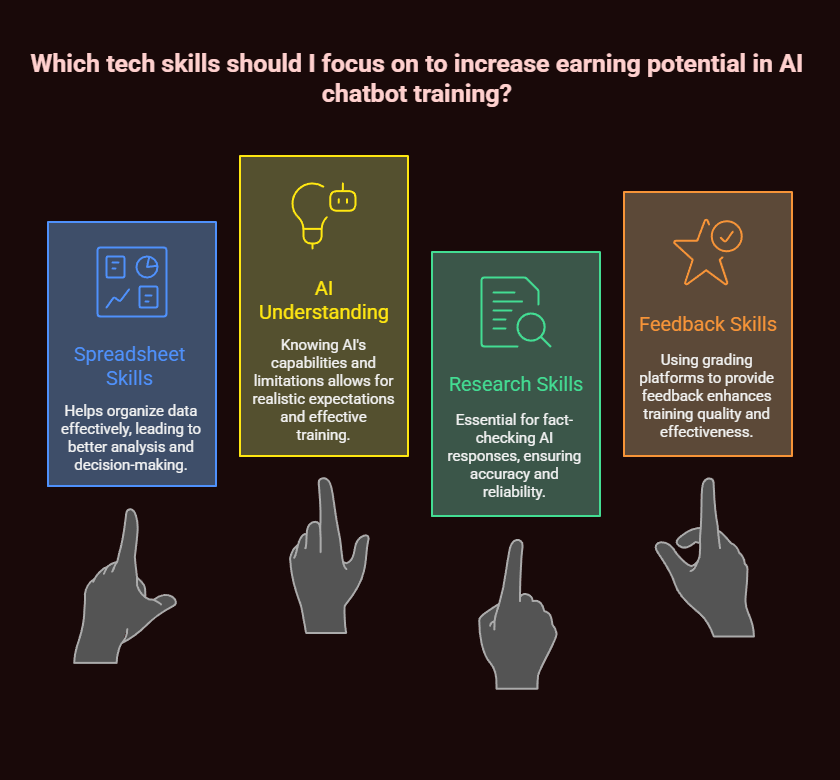
Network Building and Community Engagement
The group of people who design and train AI systems is quite small. Thus, everyone’s reputation matters a lot. I’ve got suggestions for projects from other trainers and companies hired by community referrals.
I have been involved in forums, such as Reddit’s r/postdoc (which mainly discusses AI training opportunities) and LinkedIn AI groups, where I have connected with peer trainers and clients.
The Future Landscape of AI Chatbot Training Jobs
Market Expansion Projections
AI chatbot training jobs will see growth through 2025-2027, according to industry analysis. The global machine learning market is projected to reach $113.10 billion in 2025 and $503.40 billion by 2030, driving sustained demand for human trainers.
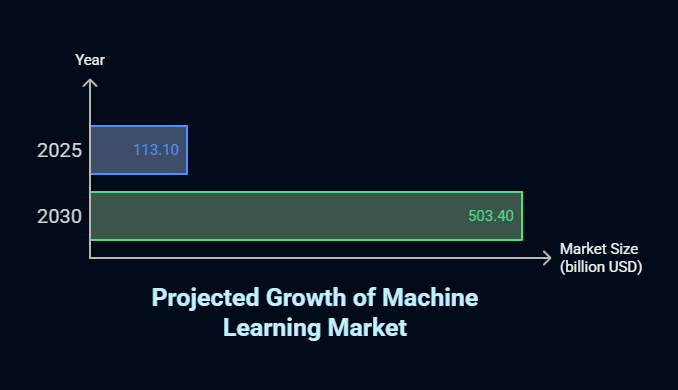
However, the nature of these roles is evolving. Machines are taking over the simpler tests for conversation evaluation. However, for aspects such as reasoning, ethics, and culture, they require human intervention.
Emerging Specialization Areas
New specialization opportunities I’ve observed include:
- Analyzing Safety and Ethics of AI.
- Multilingual conversation training.
- Industry-specific regulatory compliance.
- Creative.
Is AI Chatbot Training Right for You?
AI Chatbot Trainer jobs, which were once merely an experimental form of job in 2025-26, are now a full-fledged job option. It is mainly for remote workers to enjoy workplace flexibility and career growth with robust earning potential. The demand for trainers is only increasing as businesses introduce AI systems in finance, medicine, education, and customer service, even though the workflow is not regular and project-based.
You can earn a steady income with AI chatbot training if you refine your communication skills, pay attention to details, and get trained in a niche. And over time, you may have opportunities in the AI industry. Diversification across platforms, building a portfolio, and identifying trends early are essential keys to success.
Put simply, artificial intelligence may get ‘smarter,’ but it still needs human trainers, which is the job you do.

